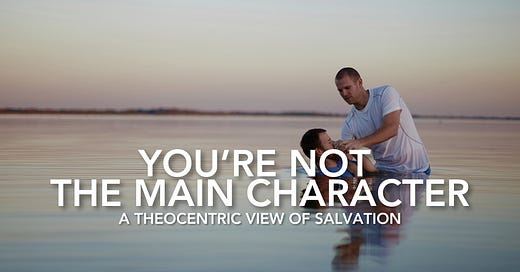We tend to think about salvation primarily from our own personal perspective. We think about how we “get saved,” what we’re supposed to do when we are saved, and whether or not we can lose our salvation. These are not wrong or bad concerns, but I’d like to suggest that they should be secondary.
A Theocentric View
I would like to suggest that we move from an anthropocentric (human-centered) view to a theocentric (God-centered) view of salvation. In other words, when we think about salvation, we should think about it first from God’s perspective. We should shift our primary concerns from ourselves to what God has done, is doing, and will do to save people; and, just as importantly, why God saves people.
Unfortunately, we are so used to seeing ourselves as the main characters, it may seem strange or unnecessary to shift to a theocentric view. So, please allow me to illustrate. Imagine that a billionaire philanthropist created a charitable organization. Every day, new people were added to his organization. When they were added, all of their personal debts were forgiven and they became recruits in accomplishing the founder’s mission. In fact, more than simply recruits, they became part of the founder’s family and heirs to his vast fortune.
Sadly, over time, the world became so familiar with the story of the founder and his gift that their focus started shifting. Instead of it being a story about the founder’s generosity and mission, people started focusing on how they could personally get in on the benefits. Their primary questions about the founder were primarily self-seeking and self-interested, “What do I have to do to become part of the founder’s organization?” and, “How often will he let me skip work before he fires me?”
Do you see the problem? When it comes to the story of salvation, we have made it primarily a story about ourselves, rather than a story about God’s generosity and mission.
The Difference it Makes
This shift in perspective has a lot of practical implications. First, when we focus on ourselves, we tend to waver between self-loathing and pride. We worry we haven’t correctly fulfilled all the requirements to be saved, but we also turn around and congratulate ourselves on being better than other people. In other words, when we make salvation about us, we become obsessed with ourselves.
Again, let me be clear, it isn’t that questions about what we must do, or must not do, are bad questions. It is simply that, as it pertains to salvation, these should never be our primary focus. You and I are not big enough, strong enough, smart enough, or good enough to bear the weight of being the focal point of this story.
On the other hand, when we focus first and foremost on God, the story of salvation motivates us to obsess about him, rather than ourselves. God can certainly bear the weight of being the main character in the story. This is how Scripture seems to frame the conversation. So, if we want to rightly understand Scripture, we will respect the relative weight the authors assign to each topic.
Consider where Paul begins the conversation about salvation and where he places the emphasis:
“Blessed be the God and Father of our Lord Jesus Christ, who has blessed us in Christ with every spiritual blessing in the heavenly places, even as he chose us in him before the foundation of the world, that we should be holy and blameless before him. In love he predestined us for adoption to himself as sons through Jesus Christ, according to the purpose of his will, to the praise of his glorious grace, with which he has blessed us in the Beloved. In him we have redemption through his blood, the forgiveness of our trespasses, according to the riches of his grace, which he lavished upon us, in all wisdom and insight making known to us the mystery of his will, according to his purpose, which he set forth in Christ as a plan for the fullness of time, to unite all things in him, things in heaven and things on earth” (Ephesians 1:3–10, ESV).
Do you see how Paul focuses on God’s choice, love, purpose, grace, redemption, forgiveness, will, and plan? God is the subject, we are the direct object of the conversation.
A New Series
This is the first post in a new series about salvation. I want to think through various aspects of salvation with a theocentric view. I believe it will help all of us gain a better appreciation of what the Scriptures mean when they speak of “salvation.” I also hope it will encourage us to respond more enthusiastically to the message of salvation.
Just because we move our response to a secondary position in the conversation does not mean it becomes unimportant. Our faithful and obedient response to God’s work is important, but it is a response; by definition, a response is a secondary action.
I love you and God loves you,
Wes McAdams






Truth 🙌 This reminds me of the “what about me” robot skit that Joyce Meyer shared years ago…
I wrote a note a couple of weeks back saying We all think we're the main characters in our own movies, but in reality we're all supporting characters. I try to remember that whenever my ego feels like everything should be all about me!